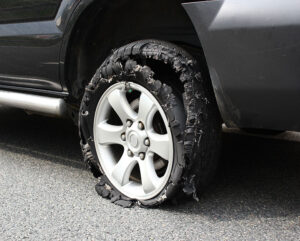Owning a car in Nigeria comes with freedom, convenience, and responsibility. Beyond just fueling your car and maintaining it regularly, every car owner is legally required to possess and carry certain documents to avoid fines, penalties, or in some cases, vehicle impoundment. Whether you’re a first-time car owner or a seasoned driver, this guide will help you understand the necessary documents every car owner must have in Nigeria.
In this article, we’ll break down the essential documents, explain their purposes, the issuing bodies, how to get them, and the consequences of not having them.
1. Vehicle Registration Documents
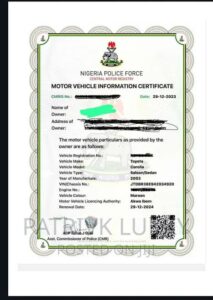
Purpose: To prove that your car is legally registered with the appropriate authorities in Nigeria.
When you buy a new or fairly used car, the first step is to register the vehicle with the Federal Road Safety Corps (FRSC) through a State Board of Internal Revenue (BIR) or a Vehicle Inspection Office (VIO).
Documents issued during registration include:
- Vehicle License
- Proof of Ownership
- Registration Certificate
- Number Plate Allocation Form
Validity: 1 year
Penalty for Not Having It: Fines, harassment by law enforcement, or vehicle impoundment.
2. Vehicle License
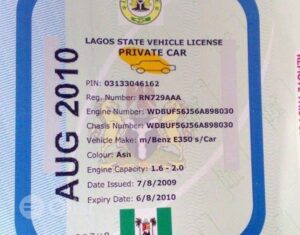
Purpose: Confirms that your vehicle is roadworthy and legally allowed on Nigerian roads.
Where to Renew: Licensing office, VIO office, or online through the FRSC website or state licensing portals.
Penalty: Driving with an expired license attracts fines or vehicle seizure.
3. Proof of Ownership
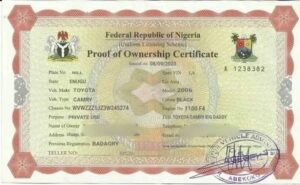
Purpose: Confirms the legal owner of the vehicle. Needed for resale, transfer, or legal disputes.
Issued by: BIR or VIO during vehicle registration.
4. Certificate of Roadworthiness
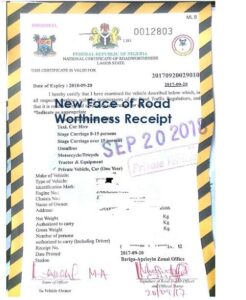
Purpose: Shows that your car has passed safety and emissions inspections.
Issued by: Vehicle Inspection Office (VIO)
Validity: 6 months to 1 year depending on vehicle type.
Penalty: Fines or failed document renewal if absent.
5. Motor Vehicle Insurance Certificate
Purpose: Covers damages in the event of an accident or loss.
Types:
- Third-Party Insurance (Mandatory) – Covers others involved in an accident.
- Comprehensive Insurance – Covers both your car and others.
How to Verify: Use the NIID portal
Validity: 1 year
Penalty: Legal prosecution or fines.
6. Driver’s License
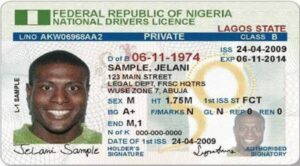
Purpose: Certifies that the driver is trained and legally permitted to drive.
Issued by: Federal Road Safety Corps (FRSC)
Renewal Period: Every 3 to 5 years
Apply online at: nigeriadriverslicence.org
Penalty: Arrest or fines for expired or fake licenses.
7. Tinted Permit (If Applicable)
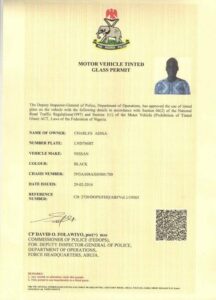
Purpose: Mandatory for cars with factory-fitted or aftermarket tinted windows.
Issued by: Nigeria Police Force
Validity: Indefinite (but revocable)
Apply via: Nigeria Police website
Penalty: Fines or order to remove tint.
8. Custom Duty Papers (For Imported Cars)
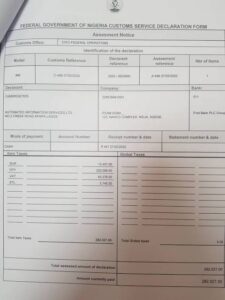
Purpose: Confirms that your imported car cleared customs duties.
Why Important: Required for registration, ownership proof, and legal road use.
How to Verify: Use Nigeria Customs Service’s VIN checker.
Penalty: Vehicle seizure or legal issues.
9. Roadworthiness Tag (Physical Sticker)
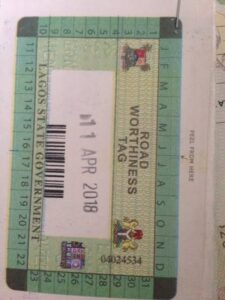
Purpose: A visual indicator on your windshield confirming the car passed inspection.
Required For: Mostly commercial or older vehicles.
10. Hackney Permit (For Commercial Vehicles)
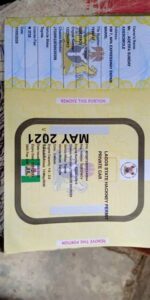
Purpose: Allows a vehicle to operate commercially (taxis, buses, haulage).
Issued by: State Ministry of Transport or VIO.
Includes: Commercial color painting, inspections, and additional fees.
Quick Checklist for Car Owners in Nigeria
| Document | Required For | Renewal Period |
|---|---|---|
| Vehicle Registration | All vehicles | Yearly |
| Vehicle License | All vehicles | Yearly |
| Proof of Ownership | All vehicles | One-time |
| Roadworthiness Certificate | Commercial/Old vehicles | 6–12 months |
| Insurance Certificate | All vehicles | Yearly |
| Driver’s License | All drivers | 3–5 years |
| Tinted Permit | Vehicles with tint | As required |
| Custom Papers | Imported cars | One-time |
| Hackney Permit | Commercial vehicles | Yearly |
Tips for Staying Compliant
- Set Reminders: Use your phone to remind you about document renewal dates.
- Go Digital: Many agencies now offer online services—use them.
- Verify Before Buying: When buying used cars, verify all documents.
- Keep Copies: Have both digital and physical copies of key documents in your car.
- Beware of Fraudsters: Deal only with licensed agents or government offices.
Conclusion
Having the correct car documents in Nigeria is not just a legal requirement—it’s part of being a responsible car owner. Whether it’s your vehicle license, insurance, or driver’s license, these documents protect you, your vehicle, and other road users.
Regularly checking your document validity and keeping them up to date saves you from unnecessary fines, legal troubles, or the risk of vehicle seizure.
At iknowmotors.com, we’re committed to helping Nigerian drivers stay informed and empowered. If you found this article helpful, share it with other car owners and follow us for more tips on car ownership, maintenance, and auto-related updates.
Got a question about any of these documents? Drop it in the comments or reach out to us—we’ll be glad to help!




